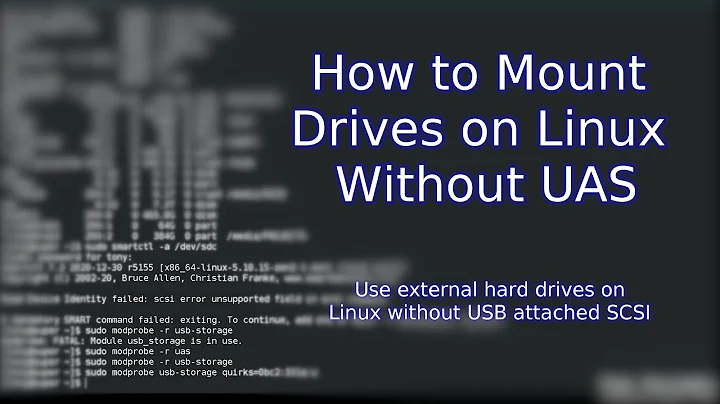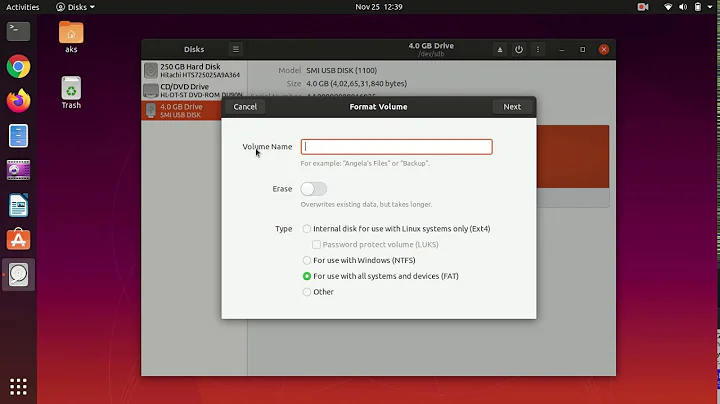Connection problem with USB3 external storage on Linux (UAS driver problem)
Solution 1
I ran into this issue today on a 4.8.0 kernel.
According to this forum post it can be circumvented by
$ echo options usb-storage quirks=357d:7788:u | sudo tee /etc/modprobe.d/blacklist_uas_357d.conf
$ sudo update-initramfs -u
and rebooting.
Solution 2
I had this same issue on Mint 18, but the solution I found can probably be applied to *Ubuntu 15/16 as well as similar Linux distributions. For me, however, I was getting an irrecoverable system lockup soon after seeing the UAS errors in dmesg.
My enclosure has an ASMedia ASM1053 chip, which seems to have issues with the UAS module of my kernel (4.4.0-72-generic).
After a bit of searching, I combined two solutions I found: this one, which YtvwlD mentioned and this one.
First, you must get the hardware ID of your device using the lsusb command. Once you do that, locate your external/enclosure/bridge. It might show up like below:
Bus 002 Device 002: ID 174c:5136 ASMedia Technology Inc. ASM1053 SATA 6Gb/s bridge
In my case, the ID is 174c:5136.
After that, you must create a file in /etc/modprobe.d/ so the proper device is blacklisted from using UAS (which is causing issues), update the initramfs image using update-initramfs, then reboot for the change to take effect.
$ echo options usb-storage quirks=174c:5136:u | sudo tee /etc/modprobe.d/blacklist_uas.conf
$ sudo update-initramfs -u
$ sudo reboot
Of course, replace "174c:5136" with the hardware ID of your bridge/enclosure/external. If done correctly, you should see a message like this from dmesg when you connect your device after rebooting:
[ 93.985002] usb 4-1: UAS is blacklisted for this device, using usb-storage instead
I haven't had any issues with my enclosure since.
Solution 3
In order to apply the quirk mentioned by other answers on the fly, you can also set it at runtime:
echo "152d:0583:u" | sudo tee /sys/module/usb_storage/parameters/quirks
Replace 152d:0583 with the USB device ID of your device, of course.
This will set the quirks parameter of the usb-storage module to the aforementioned value without requiring a reboot.
Related videos on Youtube
shalini Ragothaman
Updated on September 18, 2022Comments
-
shalini Ragothaman over 1 year
On Ubuntu 15.10, when I want to format using the NTFS file system an external 4TO disk connected by USB3 (on a StarTech USB/eSATA hard disk dock), I have a lot of I/O errors, and the format fails.
I tried GParted v 0.19, and GParted on the latest live CD
gparted-live-0.23.0-1-i586.iso, with the same problem.After that, and using GParted on Ubuntu 15.10 and the same USB3 connection, I tried to format as
ext4, without problems. It's really strange.Because I don't know if the
mkfs.ext4tools used by GParted to format the disk test the disk like (or not like)mkntfs, I first suppose that the problem is linked to the new disk. Perhaps this new disk is causing problems. So I try runninge2fsck -con this HDD. On Ubuntu 15.10,e2fsck -cfreezes at 0.45%, and I don't know why.So, using another version of Ubuntu (15.04) on the same PC, I try to connect the same 4TO disk using the eSATA connection of the StarTech HDD dock. This time,
e2fsck -cruns correctly.After some hours, you can see the result:
sudo e2fsck -c /dev/sdc1 e2fsck 1.42.12 (29-Aug-2014) ColdCase : récupération du journal Vérification des blocs défectueux (test en mode lecture seule) : complété ColdCase: Updating bad block inode. Passe 1 : vérification des i-noeuds, des blocs et des tailles Passe 2 : vérification de la structure des répertoires Passe 3 : vérification de la connectivité des répertoires Passe 4 : vérification des compteurs de référence Passe 5 : vérification de l'information du sommaire de groupe ColdCase: ***** LE SYSTÈME DE FICHIERS A ÉTÉ MODIFIÉ ***** ColdCase : 11/244195328 fichiers (0.0% non contigus), 15377150/976754176 blocsI'm not an expert in
badblockoutputs, but it seems there is no bad block at all on this disk?So, if the problem is not the hard drive, maybe the problem can be linked to
mkntfsused over USB3? What other tests can I try?Some information about the USB dock:
➜ ~ lsusb ... Bus 002 Device 002: ID 174c:55aa ASMedia Technology Inc. ASM1051E SATA 6Gb/s bridge, ASM1053E SATA 6Gb/s bridge, ASM1153 SATA 3Gb/s bridge ... ➜ ~ sudo lsusb -v -d 174c:55aa Mot de passe [sudo] pour reyman : Bus 002 Device 002: ID 174c:55aa ASMedia Technology Inc. ASM1051E SATA 6Gb/s bridge, ASM1053E SATA 6Gb/s bridge, ASM1153 SATA 3Gb/s bridge Device Descriptor: bLength 18 bDescriptorType 1 bcdUSB 3.00 bDeviceClass 0 (Defined at Interface level) bDeviceSubClass 0 bDeviceProtocol 0 bMaxPacketSize0 9 idVendor 0x174c ASMedia Technology Inc. idProduct 0x55aa ASM1051E SATA 6Gb/s bridge, ASM1053E SATA 6Gb/s bridge, ASM1153 SATA 3Gb/s bridge bcdDevice 1.00 iManufacturer 2 asmedia iProduct 3 ASM1053E iSerial 1 123456789012 bNumConfigurations 1 Configuration Descriptor: bLength 9 bDescriptorType 2 wTotalLength 121 bNumInterfaces 1 bConfigurationValue 1 iConfiguration 0 bmAttributes 0xc0 Self Powered MaxPower 36mA Interface Descriptor: bLength 9 bDescriptorType 4 bInterfaceNumber 0 bAlternateSetting 0 bNumEndpoints 2 bInterfaceClass 8 Mass Storage bInterfaceSubClass 6 SCSI bInterfaceProtocol 80 Bulk-Only iInterface 0 Endpoint Descriptor: bLength 7 bDescriptorType 5 bEndpointAddress 0x81 EP 1 IN bmAttributes 2 Transfer Type Bulk Synch Type None Usage Type Data wMaxPacketSize 0x0400 1x 1024 bytes bInterval 0 bMaxBurst 15 Endpoint Descriptor: bLength 7 bDescriptorType 5 bEndpointAddress 0x02 EP 2 OUT bmAttributes 2 Transfer Type Bulk Synch Type None Usage Type Data wMaxPacketSize 0x0400 1x 1024 bytes bInterval 0 bMaxBurst 15 Interface Descriptor: bLength 9 bDescriptorType 4 bInterfaceNumber 0 bAlternateSetting 1 bNumEndpoints 4 bInterfaceClass 8 Mass Storage bInterfaceSubClass 6 SCSI bInterfaceProtocol 98 iInterface 0 Endpoint Descriptor: bLength 7 bDescriptorType 5 bEndpointAddress 0x81 EP 1 IN bmAttributes 2 Transfer Type Bulk Synch Type None Usage Type Data wMaxPacketSize 0x0400 1x 1024 bytes bInterval 0 bMaxBurst 15 MaxStreams 16 Data-in pipe (0x03) Endpoint Descriptor: bLength 7 bDescriptorType 5 bEndpointAddress 0x02 EP 2 OUT bmAttributes 2 Transfer Type Bulk Synch Type None Usage Type Data wMaxPacketSize 0x0400 1x 1024 bytes bInterval 0 bMaxBurst 15 MaxStreams 16 Data-out pipe (0x04) Endpoint Descriptor: bLength 7 bDescriptorType 5 bEndpointAddress 0x83 EP 3 IN bmAttributes 2 Transfer Type Bulk Synch Type None Usage Type Data wMaxPacketSize 0x0400 1x 1024 bytes bInterval 0 bMaxBurst 15 MaxStreams 16 Status pipe (0x02) Endpoint Descriptor: bLength 7 bDescriptorType 5 bEndpointAddress 0x04 EP 4 OUT bmAttributes 2 Transfer Type Bulk Synch Type None Usage Type Data wMaxPacketSize 0x0400 1x 1024 bytes bInterval 0 bMaxBurst 0 Command pipe (0x01) Binary Object Store Descriptor: bLength 5 bDescriptorType 15 wTotalLength 22 bNumDeviceCaps 2 USB 2.0 Extension Device Capability: bLength 7 bDescriptorType 16 bDevCapabilityType 2 bmAttributes 0x00000002 Link Power Management (LPM) Supported SuperSpeed USB Device Capability: bLength 10 bDescriptorType 16 bDevCapabilityType 3 bmAttributes 0x00 wSpeedsSupported 0x000e Device can operate at Full Speed (12Mbps) Device can operate at High Speed (480Mbps) Device can operate at SuperSpeed (5Gbps) bFunctionalitySupport 1 Lowest fully-functional device speed is Full Speed (12Mbps) bU1DevExitLat 10 micro seconds bU2DevExitLat 2047 micro seconds Device Status: 0x0001 Self PoweredInformation about the disk in question:
/dev/sdd➜ ~ sudo fdisk -l /dev/sdd Disque /dev/sdd : 3,7 TiB, 4000787030016 octets, 7814037168 secteurs Unités : sectors of 1 * 512 = 512 octets Sector size (logical/physical): 512 bytes / 4096 bytes I/O size (minimum/optimal): 4096 bytes / 33553920 bytes Disklabel type: gpt Disk identifier: ACD5760B-2898-435E-82C6-CB3119758C9B Périphérique Start Fin Secteurs Size Type /dev/sdd1 2048 7814035455 7814033408 3,7T Linux filesystemdmesgreturns a lot of errors about the disk; see this extract:[ 68.856381] scsi host6: uas_eh_bus_reset_handler start [ 68.968376] usb 2-2: reset SuperSpeed USB device number 2 using xhci_hcd [ 68.989825] scsi host6: uas_eh_bus_reset_handler success [ 99.881608] sd 6:0:0:0: [sdd] tag#12 uas_eh_abort_handler 0 uas-tag 13 inflight: CMD OUT [ 99.881618] sd 6:0:0:0: [sdd] tag#12 CDB: Write(16) 8a 00 00 00 00 00 e8 c4 08 00 00 00 00 08 00 00 [ 99.881856] sd 6:0:0:0: [sdd] tag#5 uas_eh_abort_handler 0 uas-tag 6 inflight: CMD OUT [ 99.881861] sd 6:0:0:0: [sdd] tag#5 CDB: Write(16) 8a 00 00 00 00 00 cd 01 08 f0 00 00 00 10 00 00 [ 99.881967] sd 6:0:0:0: [sdd] tag#4 uas_eh_abort_handler 0 uas-tag 5 inflight: CMD OUT [ 99.881972] sd 6:0:0:0: [sdd] tag#4 CDB: Write(16) 8a 00 00 00 00 00 cd 01 08 00 00 00 00 f0 00 00 [ 99.882085] sd 6:0:0:0: [sdd] tag#3 uas_eh_abort_handler 0 uas-tag 4 inflight: CMD OUT [ 99.882090] sd 6:0:0:0: [sdd] tag#3 CDB: Write(16) 8a 00 00 00 00 00 cd 01 07 10 00 00 00 f0 00 00 [ 99.882171] sd 6:0:0:0: [sdd] tag#2 uas_eh_abort_handler 0 uas-tag 3 inflight: CMD OUT [ 99.882175] sd 6:0:0:0: [sdd] tag#2 CDB: Write(16) 8a 00 00 00 00 00 cd 01 06 20 00 00 00 f0 00 00 [ 99.882255] sd 6:0:0:0: [sdd] tag#1 uas_eh_abort_handler 0 uas-tag 2 inflight: CMD OUT [ 99.882258] sd 6:0:0:0: [sdd] tag#1 CDB: Write(16) 8a 00 00 00 00 00 cd 01 05 30 00 00 00 f0 00 00 [ 99.882338] sd 6:0:0:0: [sdd] tag#0 uas_eh_abort_handler 0 uas-tag 1 inflight: CMD OUT [ 99.882342] sd 6:0:0:0: [sdd] tag#0 CDB: Write(16) 8a 00 00 00 00 00 cd 01 04 40 00 00 00 f0 00 00 [ 99.882419] sd 6:0:0:0: [sdd] tag#11 uas_eh_abort_handler 0 uas-tag 12 inflight: CMD OUT [ 99.882423] sd 6:0:0:0: [sdd] tag#11 CDB: Write(16) 8a 00 00 00 00 00 cd 00 f9 00 00 00 00 f0 00 00 [ 99.882480] sd 6:0:0:0: [sdd] tag#10 uas_eh_abort_handler 0 uas-tag 11 inflight: CMD OUT [ 99.882483] sd 6:0:0:0: [sdd] tag#10 CDB: Write(16) 8a 00 00 00 00 00 cd 00 f9 f0 00 00 00 f0 00 00 [ 99.882530] sd 6:0:0:0: [sdd] tag#9 uas_eh_abort_handler 0 uas-tag 10 inflight: CMD OUT [ 99.882532] sd 6:0:0:0: [sdd] tag#9 CDB: Write(16) 8a 00 00 00 00 00 cd 00 fa e0 00 00 00 f0 00 00 [ 99.882593] sd 6:0:0:0: [sdd] tag#8 uas_eh_abort_handler 0 uas-tag 9 inflight: CMD [ 99.882596] sd 6:0:0:0: [sdd] tag#8 CDB: Write(16) 8a 00 00 00 00 00 cd 00 fb d0 00 00 00 f0 00 00 [ 99.882667] scsi host6: uas_eh_bus_reset_handler start [ 99.994700] usb 2-2: reset SuperSpeed USB device number 2 using xhci_hcd [ 100.015613] scsi host6: uas_eh_bus_reset_handler success [ 135.962175] sd 6:0:0:0: [sdd] tag#5 uas_eh_abort_handler 0 uas-tag 6 inflight: CMD OUT [ 135.962185] sd 6:0:0:0: [sdd] tag#5 CDB: Write(16) 8a 00 00 00 00 00 cd 40 78 f0 00 00 00 10 00 00 [ 135.962428] sd 6:0:0:0: [sdd] tag#4 uas_eh_abort_handler 0 uas-tag 5 inflight: CMD OUT [ 135.962436] sd 6:0:0:0: [sdd] tag#4 CDB: Write(16) 8a 00 00 00 00 00 cd 40 78 00 00 00 00 f0 00 00 [ 135.962567] sd 6:0:0:0: [sdd] tag#3 uas_eh_abort_handler 0 uas-tag 4 inflight: CMD OUT [ 135.962576] sd 6:0:0:0: [sdd] tag#3 CDB: Write(16) 8a 00 00 00 00 00 cd 40 77 10 00 00 00 f0 00 00 [ 135.962682] sd 6:0:0:0: [sdd] tag#2 uas_eh_abort_handler 0 uas-tag 3 inflight: CMD OUT [ 135.962690] sd 6:0:0:0: [sdd] tag#2 CDB: Write(16) 8a 00 00 00 00 00 cd 40 76 20 00 00 00 f0 00 00 [ 135.962822] sd 6:0:0:0: [sdd] tag#1 uas_eh_abort_handler 0 uas-tag 2 inflight: CMD [ 135.962830] sd 6:0:0:0: [sdd] tag#1 CDB: Write(16) 8a 00 00 00 00 00 cd 40 75 30 00 00 00 f0 00 00 [ 160.904916] sd 6:0:0:0: [sdd] tag#0 uas_eh_abort_handler 0 uas-tag 1 inflight: CMD OUT [ 160.904926] sd 6:0:0:0: [sdd] tag#0 CDB: Write(16) 8a 00 00 00 00 00 00 00 29 08 00 00 00 08 00 00 [ 160.905068] scsi host6: uas_eh_bus_reset_handler startI found this information on this forum post, that there is some problem with UAS and new Linux kernels? It seems the problem is known in many places on the internet, USB3 + Linux seems problematic in many cases -- but for old kernels. Any ideas to resolve this problem on a more recent kernel?
My kernel is:
➜ ~ uname -r 4.2.0-16-genericHmm, it seems UAS is broken for different USB3 chips of
ASMedia Technology Inc.; you can see more information here.I suppose this is my problem, but how can I resolve it now, and which chip is used for the USB3 implementation in the StarTech dock?
-
TCB13 about 6 yearsLooks like I'm also running into this problem in Debian 9.4
4.14.18-sunxi64. :( -
TCB13 about 6 yearsFixed the issue in my kernel here: unix.stackexchange.com/a/441772/23085. Looks like some kernels have
usb-storagebuilt-in instead of loaded as a module and the procedure is a little bit different. -
 Boann over 5 yearsWhile this performance-reducing, hideous hack, applied to every machine, does allow the enclosure to basically work, it is still a performance-reducing, hideous hack, that must be applied to every machine. What if I boot a Linux live distro, expecting to be able to backup or recover files? This hack won't work there. So whom should I report this problem to? Should I report it as a Linux kernel bug? Should I leave a negative review of the enclosure, that was advertised as Linux-compatible? Whose fault is this problem?
Boann over 5 yearsWhile this performance-reducing, hideous hack, applied to every machine, does allow the enclosure to basically work, it is still a performance-reducing, hideous hack, that must be applied to every machine. What if I boot a Linux live distro, expecting to be able to backup or recover files? This hack won't work there. So whom should I report this problem to? Should I report it as a Linux kernel bug? Should I leave a negative review of the enclosure, that was advertised as Linux-compatible? Whose fault is this problem? -
 Boann over 5 yearsNote that the quirks parameter needs to be set to the particular ID of the offending device, found via
Boann over 5 yearsNote that the quirks parameter needs to be set to the particular ID of the offending device, found vialsusb. -
Dr. Tyrell over 5 yearsworked for me with the: 174c:55aa ASMedia Technology Inc. ASM1051E SATA 6Gb/s bridge, ASM1053E SATA 6Gb/s bridge, ASM1153 SATA 3Gb/s bridge
-
Mikko Rantalainen over 5 years@Boann any device that kernel tries to use with UAS protocol that does not work correctly is technically a broken hardware. The hardware should not advertise UAS support unless it really works. You still can report this to Linux kernel usb subsystem maintainers that have a list of known-bad hardware that can still be used if handled specially. You can also opt-in to various workarounds using
quirksparameter ofusb_storagemodule - exactly the same thing will be activated automatically if kernel developers know about the issue. The performance will still be reduced and/or features missing. -
Laurent' over 3 yearsI couldn't get my raspbian to take the /etc/modprobe/blacklist_uas.conf hack into account (no confirmation on dmesg, /sys/module/usb_storage/parameters/quicks empty) so I used @T4cC0re answer instead in /etc/rc.local).
-
Laurent' over 3 yearsCouldn't get my raspberry pi 4 to take a /etc/modprobe.d/blacklist_uas.conf hack (@Cinos Modnar answer) into account, so I ended using your solution in /etc/rc.local. So far it's working!
-
Wolkenjaeger over 3 yearsIt worked for me. Is this just a different way of doing this instead of doing the /etc/modprobe.d/blacklist_uas.conf, or do I have to do this for every new boot?
-
lcnittl over 3 yearsWould it not be better to use
teewith the-aflag to not accidentally overwrite data ifquirksalready contains some?


![USB 3.0 Hard Disk Not Recognized In Windows 10/8/7 FIX [Tutorial]](https://i.ytimg.com/vi/BDB4cbjKXIs/hqdefault.jpg?sqp=-oaymwEcCOADEI4CSFXyq4qpAw4IARUAAIhCGAFwAcABBg==&rs=AOn4CLADPMR97OtDOnngo2_17gLowzhHhQ)
![How to Fix USB Files Not Showing But Space Used Issue? [5 Solutions]](https://i.ytimg.com/vi/Z3hTqHrIY-w/hq720.jpg?sqp=-oaymwEcCNAFEJQDSFXyq4qpAw4IARUAAIhCGAFwAcABBg==&rs=AOn4CLAaNU0MDbfbQ8xs61RaRkrsvWS0cQ)



